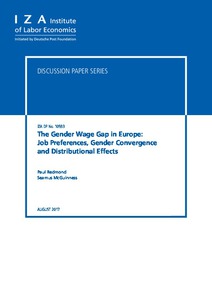The gender wage gap in Europe: job preferences, gender convergence and distributional effects
"The gender wage gap has declined in magnitude over time; however, the gap that remains is largely unexplained due to gender convergence in key wage determining characteristics. In this paper we show that the degree of gender convergence differs across countries in Europe. Most, if not all, of...
| Main Authors: | , |
|---|---|
| Institution: | ETUI-European Trade Union Institute |
| Format: | TEXT |
| Language: | English |
| Published: |
Bonn
2017
IZA |
| Subjects: | |
| Online Access: | https://www.labourline.org/KENTIKA-19286443124910046259-The-gender-wage-gap-in-europe-.htm |
| Summary: | "The gender wage gap has declined in magnitude over time; however, the gap that remains is largely unexplained due to gender convergence in key wage determining characteristics. In this paper we show that the degree of gender convergence differs across countries in Europe. Most, if not all, of the wage gap is unexplained in some countries, predominantly in Eastern Europe, while in some central and peripheral countries, differences between the characteristics of males and females can still explain a relatively large proportion of the wage gap. We investigate whether gender differences relating to job preferences play a role in explaining the gender wage gap. We find that females are more motivated than males to find a job that is closer to home and offers job security, whereas males are motivated by financial gain. The average gender wage differential in Europe is 12.2 percent and gender differences in job preferences are associated with a 1.3 percentage point increase in the wage gap. We find that preferences explain more of the gender wage gap than the individual components relating to age, tenure and previous employment status. A quantile decomposition reveals that job preferences play a greater role in explaining the wage gap at the top of the wage distribution." |
|---|---|
| Physical Description: | 25 p. Digital |

